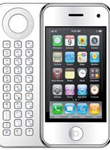 Market acceptance and momentum are growing for unlocked cell phones, which are handsets that are not tied to a particular carrier company, like AT&T, but can be used with a range of services. Google’s new Nexus One comes unlocked by default. AT&T announced last week that it will unlock all of its phones except for the iPhone. And as customers become more savvy about the marketplace, pundits are touting the benefits of unlocked phones and criticizing locked ones. For years, and still to a large extent today, the default option accepted by most consumers was to buy a subsidized phone that was locked to a particular carrier, and at the same time commit to a two year plan. But it is easy to find out how to unlock phones, even Apple’s iPhone, and it is legal to buy a phone that comes already unlocked. And the Web has many pages devoted to using an unlocked phone.
Market acceptance and momentum are growing for unlocked cell phones, which are handsets that are not tied to a particular carrier company, like AT&T, but can be used with a range of services. Google’s new Nexus One comes unlocked by default. AT&T announced last week that it will unlock all of its phones except for the iPhone. And as customers become more savvy about the marketplace, pundits are touting the benefits of unlocked phones and criticizing locked ones. For years, and still to a large extent today, the default option accepted by most consumers was to buy a subsidized phone that was locked to a particular carrier, and at the same time commit to a two year plan. But it is easy to find out how to unlock phones, even Apple’s iPhone, and it is legal to buy a phone that comes already unlocked. And the Web has many pages devoted to using an unlocked phone.
What isn’t easy, with cell phone stores mostly selling locked phones, is finding inexpensive unlocked phones in stores, even if a shopper wants to buy them. That’s an advantage for flea market and swap meet vendors, who can set up competing booths to sell unlocked phones. “People who buy them do not have to commit to any contract or anything like that,” says Hezi Gavra, CEO of GS Mobile, an unlocked cell phone wholesaler. “They are just buying the phone and using the same service they have already. They don’t have to sign for two years.”
Gavra sees a few key advantages in guiding customers toward unlocked phones. Not being tied to a carrier for two years is one. Being able to use a dual-SIM unlocked phone is another. A SIM card identifies you to a GSM network provider, like AT&T or T-Mobile (but not Verizon or Sprint, who do not use the GSM standard). With the option of two SIM cards, you can get service from two carriers at the same time. “The dual SIM is for people who have more than one phone. They can combine the two phones into one. They can get two phone calls at the same time on the same device,” says Gavra. Moreover, people traveling overseas can use one SIM when they are in America, and a different SIM from a local phone company in another country. That eliminates what can be very expensive overseas roaming charges.
Buying an unlocked phone also opens the option of saving money. Flea market vendors, for example, can offer generic cell phones for steep discounts, compared with other phones. “The phones that we carry are about half the price of name brand phones,” says Gavra, “We carry generic brands. The price is very competitive. People get the feel and the look of the expensive phones for a half or a third of the price of the original phone. We do a lot of selling to flea market vendors,” says Gavra. The sales advantage is so clear, in fact, that GS Mobile itself is selling phones directly to customers at a few flea market locations. “We have a few stores in flea markets where we sell at retail,” he reports.
People are so eager for bargains that GS Mobile is performing well in this economy. “The business is actually doing better now, because the phones are very nice and very inexpensive, so people get their money’s worth when they buy from us,” says Gavra, who has been selling unlocked cell phones for the last three years. “When stores buy phones from us, they cost $50 to $100, and they retail for $100 to $200.”
For more information:
GS Mobile
Hezi Gavra, CEO
5051 S. State Rd 7 Unit 505
Davie, FL 33314
Tel.: 954-581-9211
Website: gsmobileusa.com
